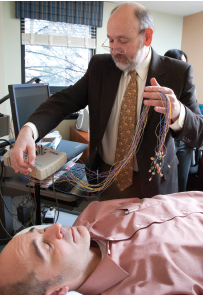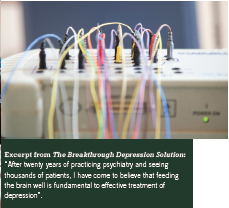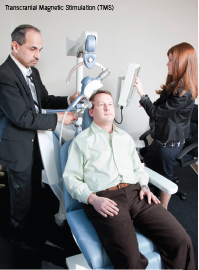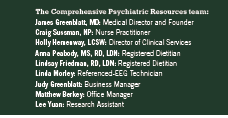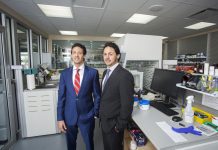James Excellence in Integrative Psychiatry
I arrived in medical school thinking brown rice and yoga was a cure for everything” states Dr James Greenblatt, a Psychiatrist practicing in the Waltham, Massachusetts (greater Boston) area. He received his license to practice adult psychiatry from George Washington University in 1990, and followed this with training in child psychiatry from John Hopkins. His interest in integrative medicine began early in his career, as he describes a seminar on “the evolution of the biomedical model” in 1988 as instrumental in the manner in which he approaches the practice of psychiatry today. Dr. Greenblatt’s commitment to integrative medicine for mental health is seen in his private outpatient practice (named Comprehensive Psychiatric Resources), and in his many lectures and seminars given throughout the US and Canada.
Dr Greenblatt exemplifies the true essence of an integrative practitioner. The formulary Dr Greenblatt calls upon is a welldefined selection of essential vitamins and minerals, functional food/ nutraceutical agents, and a selection of botanical medicines. He also relies upon a selection of integrative diagnostic tests to help individualize treatments for patients. Commonly employed integrative tests include the urinary organic acids profile, fasting plasma amino acid quantification, an opiate peptides test (looking for gliadorphin and/ or casomorphin), provocative heavy metal testing, food IgG sensitivity panels, and evaluation of essential fatty acid status.

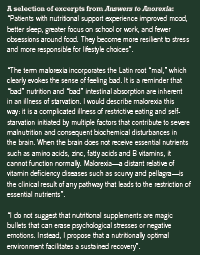 A new patient visit involves a one- hour interview with a trained social worker. A thorough history is gathered, including a genogram to track family history of illness. A thorough battery of routine lab analysis is ordered, which includes basic blood chemistry, methyl malonic acid, homocysteine and free B12 assessment as markers of B12 status, iron panel, plasma vitamin D, DHEA, testosterone, and assessment of thyroid function.
A new patient visit involves a one- hour interview with a trained social worker. A thorough history is gathered, including a genogram to track family history of illness. A thorough battery of routine lab analysis is ordered, which includes basic blood chemistry, methyl malonic acid, homocysteine and free B12 assessment as markers of B12 status, iron panel, plasma vitamin D, DHEA, testosterone, and assessment of thyroid function.
Dr Greenblatt has also championed the use of an assessment tool known as referenced EEG. The tool correlates comparative EEG data and provides a novel neuroinformatic view to medication sensitivity. Over 100 peer reviewed publications of the methodology exist, with a recent paper in the Journal of Psychiatric Research demonstrating that when the tool was used to select a prescription medication for a patient with depression, the response rate was dramatically improved. Given the generally poor response rates to prescription medications used for management of depression and other psychiatric illnesses, the tool provides a valuable strategy in improving patient compliance and ultimately patient outcomes. Patients should be medication free when undergoing the assessment, and thus for patients already medicated wishing to try the technology, supervised discontinuation of the medication is imposed. Dr Greenblatt and colleagues certainly use prescription medications with their patients when required, but the use of referenced EEG has made application of prescription medications infinitely more successful.
The Comprehensive Psychiatric Resources team has recently introduced TMS as a treatment option for patients. Transcranial Magnetic Stimulation (TMS) therapy uses a highly focused pulsed magnetic field to stimulate nerve cells in the area of the brain thought to control mood. Patients undergo five sessions per week for four to six weeks, with each session taking approximately 40 minutes. TMS has received FDA approval for patients suffering from depression who have not achieved satisfactory improvement from prior antidepressant medications.
Dr. Greenblatt is outraged and dismayed by the polypharmacy strategy that dominates mainstream psychiatric practice. Patients arrive at his treatment facility on as many as 12 or 13 psychoactive medications. “It’s an embarrassment to the fi eld of psychiatry”, states Greenblatt. e implementation of referenced EEG in-andof- itself has gone a long way to correcting the polypharmacy phenomena for the patients he manages.
The philosophy that governs Dr Greenblatt’s approach to management of the psychiatric patient is one familiar to all practitioners of integrative medicine. Dr Greenblatt describes optimal nutritional support and correcting of nutrient defi ciencies as the fi rst steps to recovery. He has published two books addressing integrative psychiatry, one entitled “Answers to Anorexia” and the other entitled “ e Breakthrough Depression Solution”. He describes the concept of biochemical individuality, citing that the majority of known polymorphisms relate to some aspect of how an individual processes a particular nutrient. e book on anorexia makes mention of “feeding the starving brain”, a notion that has since become the title of a book for strategies in autism management (Children with Starving Brains by Jacquelyn McCandless, MD).
The Comprehensive Psychiatric Resources team is in the process of moving its head offi ces. “ e Watch Factory”, a historic facility built by the Waltham Watch Company in the 1860’s, will be the new home for the clinic beginning this May. Dr. Greenblatt’s desire to relocate to this historic location parallels a quote attributable to Royal Lee, founder of the supplement manufacturer Standard Process, “it takes over 250 parts to make a watch…which component is responsible for telling time?” Dr. Greenblatt likens this to the practice of integrative psychiatry and the importance of whole food supplementation. e concept of physician as detective, sifting through medical history and laboratory analysis to attempt to discover the selection of malfunctioning “gears” responsible for a particular patient’s presenting concerns.
Psychiatry is a discipline desperately requiring more widespread application of integrative techniques. Conventional therapeutics are outright failing. Several recent meta analytic reviews in JAMA and other leading medical journals are calling for reappraisals of current guidelines specifi cally in the area of depression and other aff ective disorders. Integrative strategies prove themselves highly effi cacious, even though remaining highly underutilized. As the community of integrative healthcare providers learns of the techniques of Dr Greenblatt and others, their pioneering eff orts will invariably lead to access to these safe and eff ective techniques across the continent and beyond.

